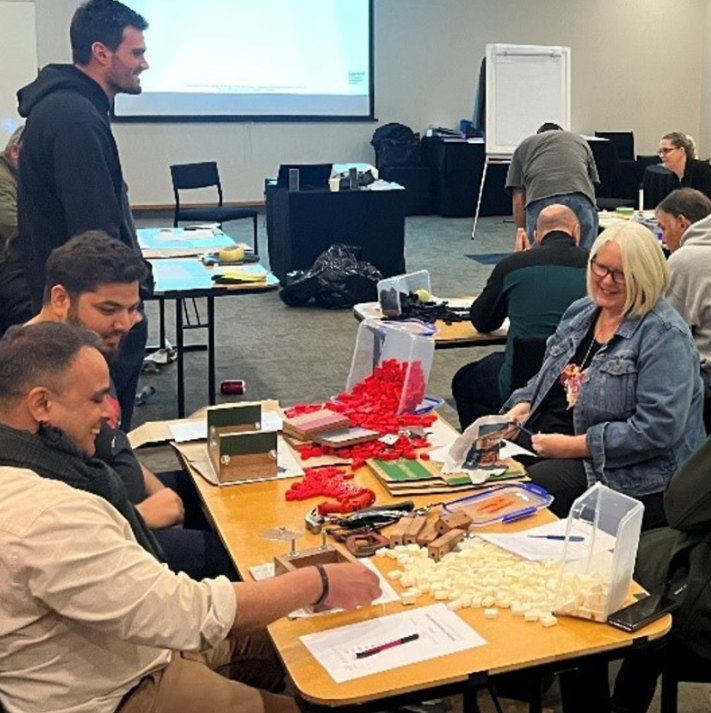Our Operations Leaders Lean into Lean

Managers, supervisors, and champions across Operations have been getting Lean – no it’s not a dieting programme, it’s a way of thinking and a way of working to drive continuous improvement and reduce waste. And it’s having a positive impact on our Operations team.
Gallagher has been working with Lean principles for some time now – it was first introduced over 10 years ago and it’s as relevant today as it was back then. So relevant in fact, the Operations leadership team wanted to ensure everyone is aligned with the practices – whether new to Lean or a seasoned expert.
Targeting heads of department, production managers, supervisors, and champions, as well as some leaders from outside Operations, around 40 people have been through the programme so far, with another 50 teed up for the new year.
Lean leadership training is part of Gallagher’s investment in growing great leaders, which also includes the Performance Focused Leadership Programme (PFLP).
The two-day Lean Leadership course, followed by five half-day workshops spread over several months, enables participants to learn or refresh the principles of Lean and put them into practice.
Uniquely, a lot of the learning took place via a simulated manufacturing environment using Lego. Duane Taylor, co-facilitator of the programme, says this was a highlight.
“It’s amazing how a group of 20 adults get so invested in making Lego blocks go faster!”
Atul Agrish, Production Manager Security/Transformers, explains.
“We were given a task to build a Lego product. When we arrived, the work area was a mess and we had to decide which roles each of the team members would do (supervisor, stores delivery person, production etc). It was about how you use all the seven ways of Lean to make production better and remove waste. It was fun.”
Alongside the fun, Atul took a lot from the training.
“It was a great opportunity to deepen my understanding and refresh the foundational concepts I learned a few years ago. I got new insights into optimising workflows and eliminating waste more effectively.”
As a result of the training, Atul has introduced a regular Gemba Walk – a practice from Lean which is all about going to the place where value is created, or in other words, where the work happens.
“I go to the team, observe process flow, ask their opinions about where things are lacking or their ideas on how we can improve the process. Once a month I do my Gemba Walk with my GM Stephen Hill and it’s very productive – the team love it too.”
Clinton Williams, Supervisor in Pukekohe, says as a result of the training he and the team have not only documented procedures and timelines for various tasks, they’re building empowerment.
“One of the guys in my team has never done drawing using software because he didn’t have access to it. Now we’ve sorted his access he’s learning how do it and feels good about it. Empowering the team in this way makes the guys feel better about their jobs and they’re more valuable to the company as well.”
Clinton says another benefit has been meeting different people from across Gallagher.
“There’s not a huge amount of networking between Hamilton and Pukekohe, but now I have contacts both ways. It was good to see the whole Lean process from start to end and all the things you can work on and pass on to your team and understand how that helps the next person up the ladder as well. It makes you think of all the little things that can be changed to make a big difference.”
Kirsten Chapman, Lead Engineer in Security, also joined the training. With an R&D team of electronic and mechanical engineers, Kirsten’s role is to create new products – an impossible process without interacting with the production team.
“It gave me a lens on what the Operations team were learning, their processes, and how they prefer to operate so we can get on the same page as we get ideas to design for manufacture. I want us to be open to help and look at things we could change in our product design to make production flow better.”
Kirsten also took away ideas she’s keen to implement in her own team.
“In the Lego simulation I felt a lot of discomfort when the work area was initially so messy and unorganised – it makes it hard to think. I knew the 6S method was important in Operations but I only realised how much when I felt the difference myself. When I look at our work area here I get a similar feeling so I’m going to use 6S with my team.”
Duane says his big focus has been ensuring the concepts learned during the training are embedded and become second nature.
“We’re looking for the ‘little lifts’ – the improvements we see as a result of Lean practices being used every day, every week, every month. We’re working with the GMs on embedding the practices through standard work, role modelling, coaching and guiding the teams.”
We’ll give Atul the last word on the impact of the programme.
“Overall this training has significantly enhanced how I manage my operations and motivate the team towards sustained efficiency improvement.”
And that folks is what it’s all about!